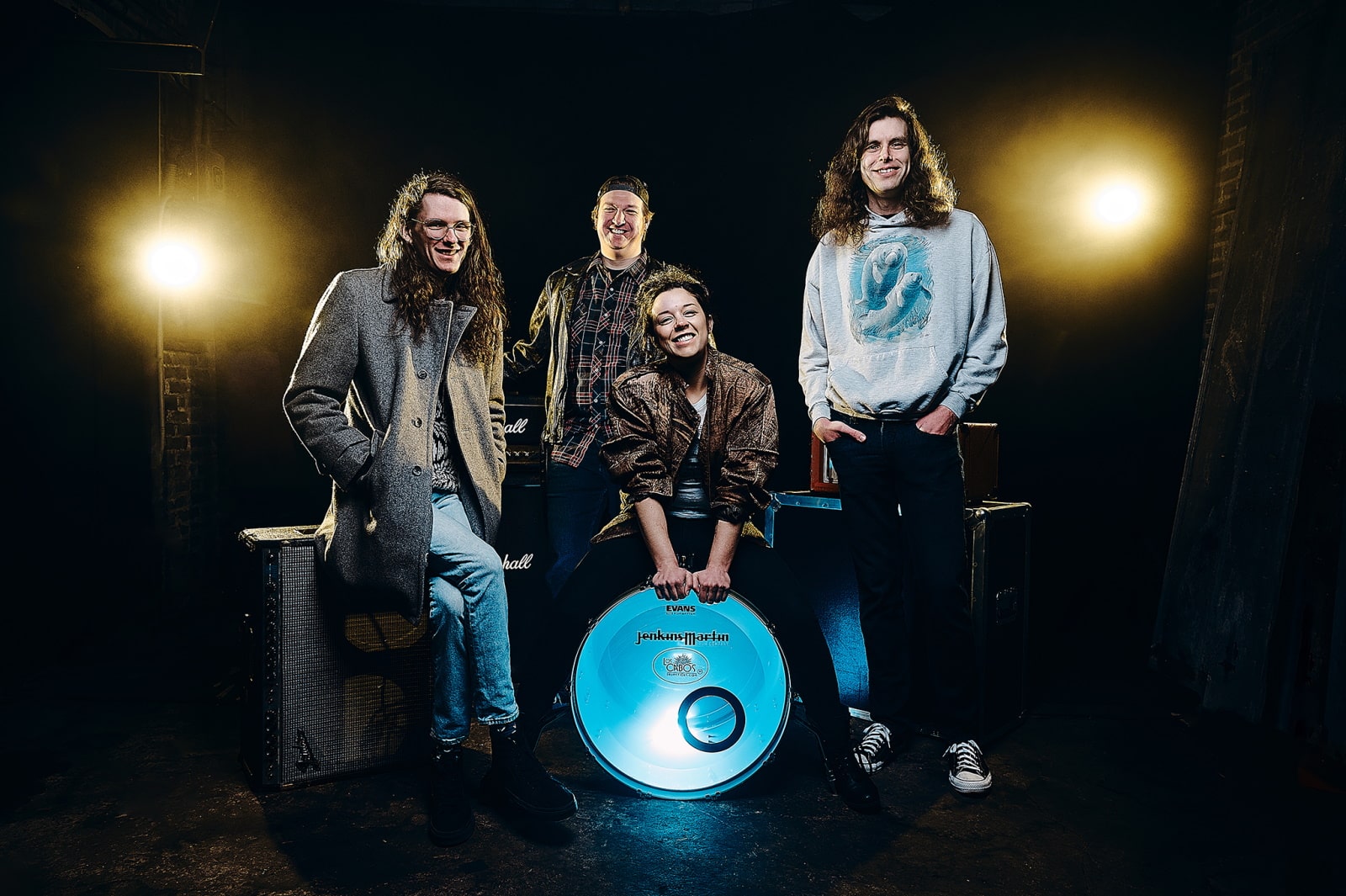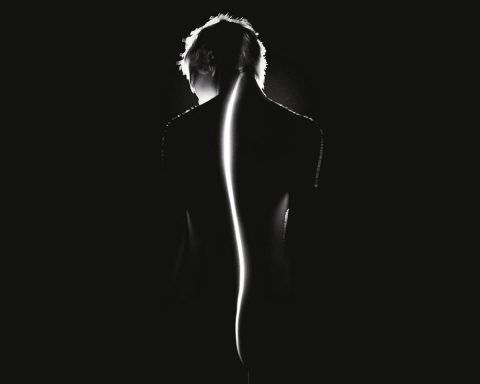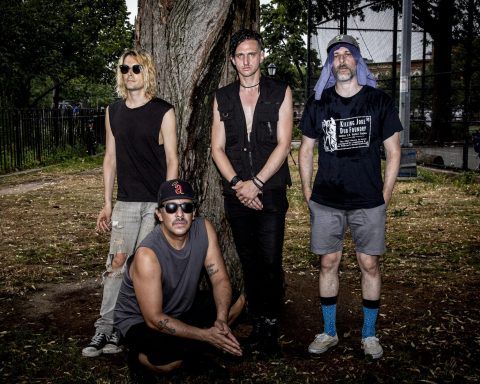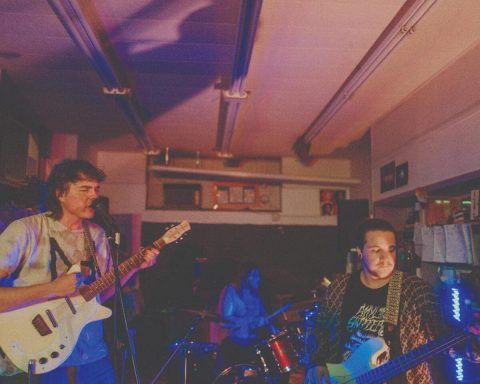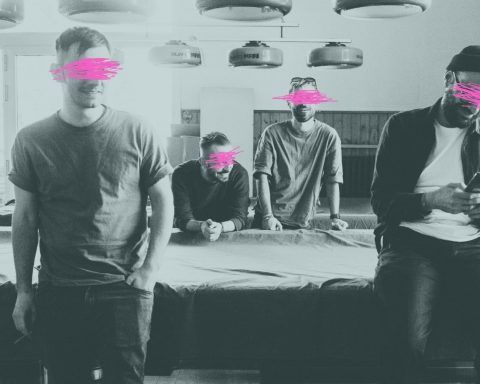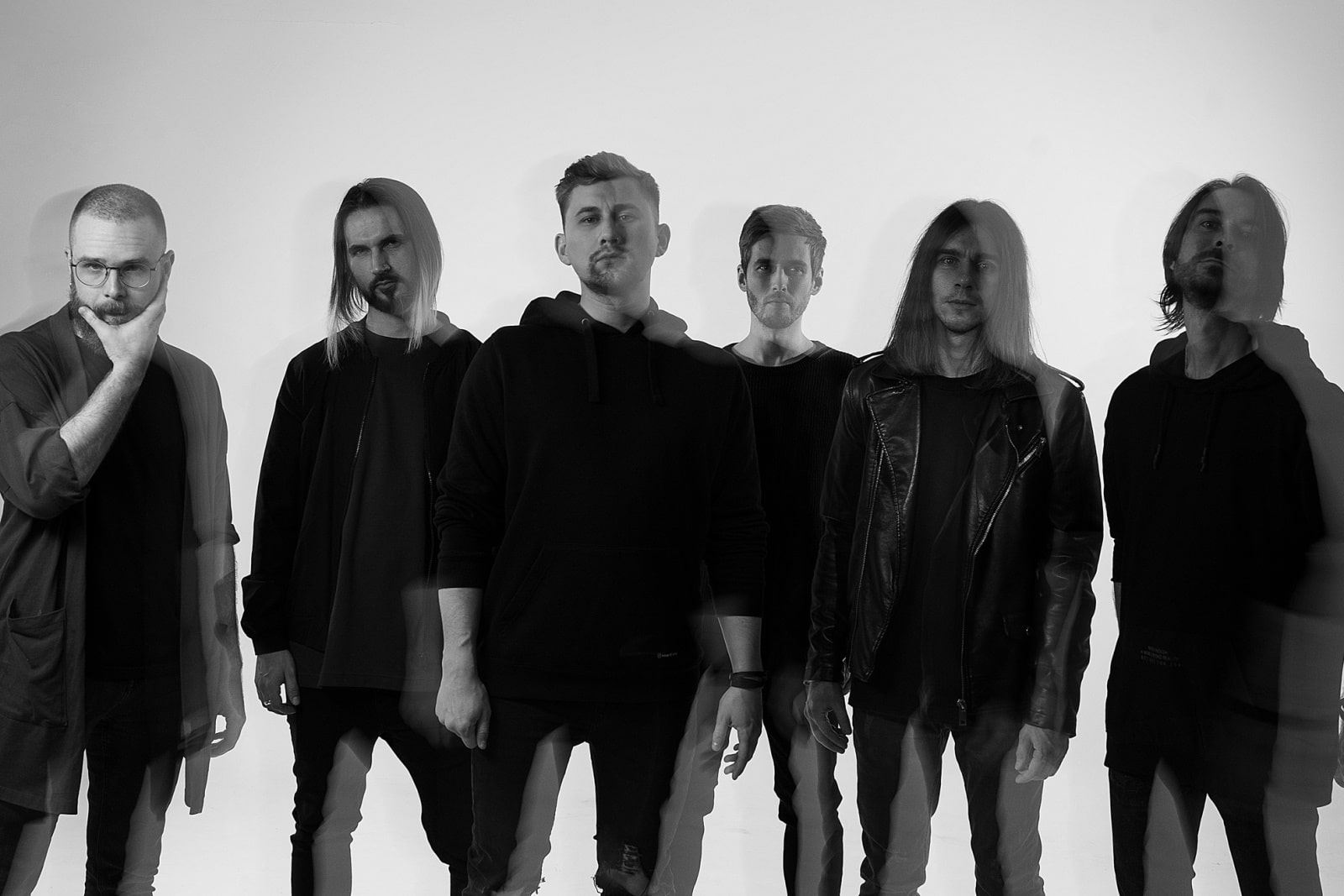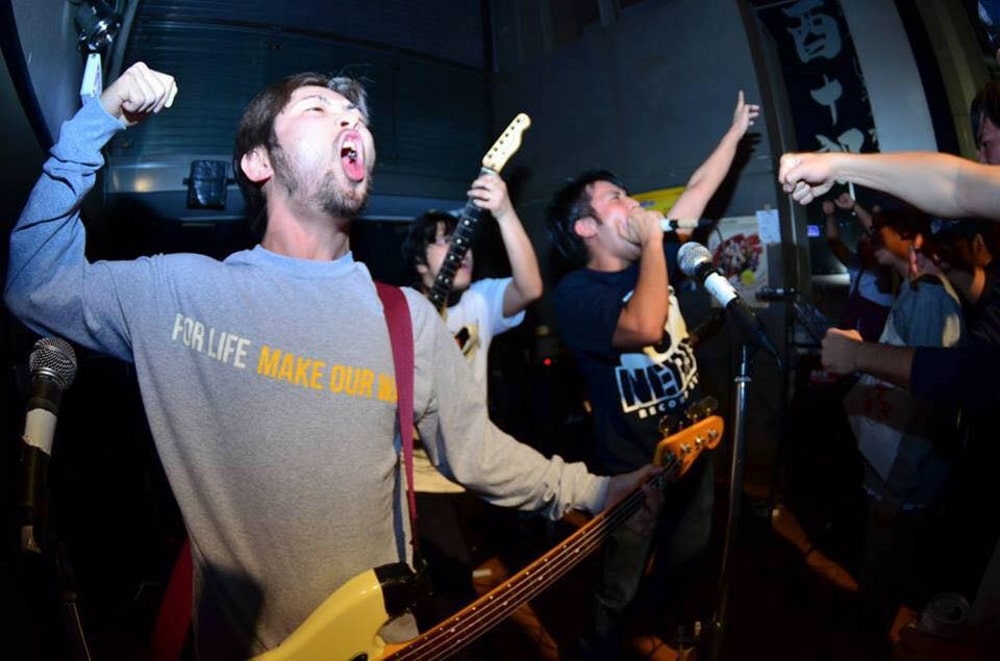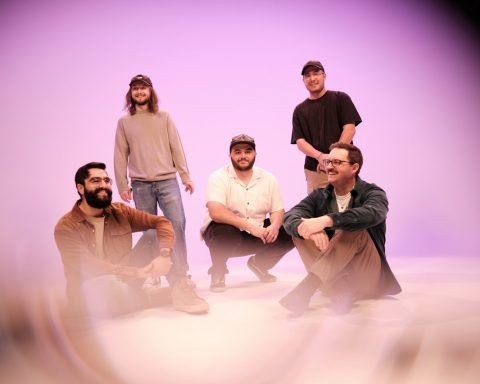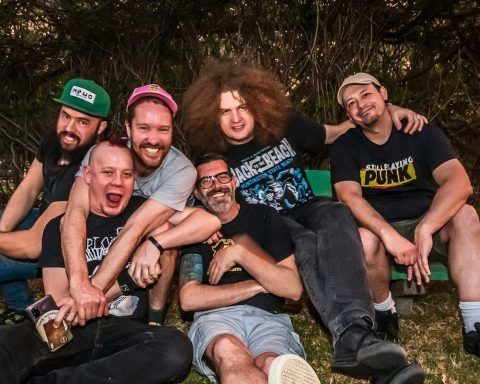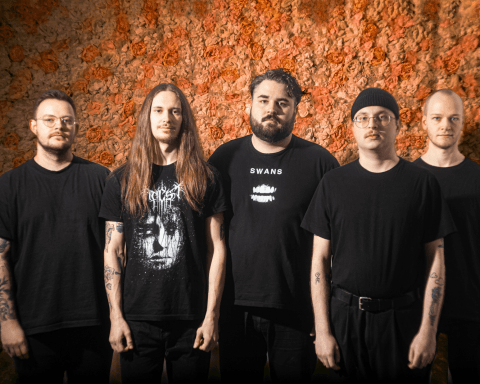CAUSTIC CASANOVA is a band who defies genre classification. On their new album, Glass Enclosed Nerve Center, they mix driving grooves, mind-melting mathiness, heavy breakdowns and perky melodic punk (among other stylistic experiments) for a blend that’s wildly inventive and jarring yet infectious.
To help celebrate the release of their new record, we asked them to compile a list of their own favorite top ten genre-bending bands. Like Caustic Casanova themselves, these bands simply won’t be pigeonholed by traditional stylistic confines, and yet they do what they do with total confidence and pretty much no concern for what rules they’re breaking.
Read on to check out their list as curated by several of the band’s members, and go here to order and listen to Glass Enclosed Nerve Center.
Caustic Casanova’s Ten Favorite Genre-Bending Bands:
Candiria
Andrew Yonki, guitar: To call them “genre agnostic” or “genre-bending” doesn’t really tell the story; rather, it would be more descriptive to call them omnisonic, as this band combines hardcore, death metal, jazz, hip-hop and ambient music (again, often in the same song) into one of the most unique sounds ever forged.
As a listener, hearing their songs is both confounding and rewarding; their best work features linear song structures, unconventionally harmonic compositions, aggressive and complex polyrhythms, and a terrifyingly multi-faceted vocalist.
Hearing them at first, one would be forgiven for considering them “just” a metal band, but heavy metal bands aren’t known for sending their fans to the jazz and ambient bins of the record store. Check out: “Paradigm Shift,” “Blood,” “Without Water,” “Pull,” “Peel This Strip and Fold Here.”
The Melvins
Francis Beringer, bass/vocals: To me, the ultimate genre-defying heavy rock band is and always will be The Melvins. I don’t care if they invented grunge and their connection to Nirvana doesn’t matter to me.
The way they’ve approached creating music, touring, album art and just about everything about being a band, practically and aesthetically, will always be a huge inspiration. The “meat” of their music (the guitar riffs, drums, and vocals) breaks just about every rule there is for metal, punk and rock.
Bizarre time signatures, off kilter rhythms and odd moments of drum fuckery I still can’t figure out after nearly two decades of fandom. Unconventional tunings and song structures, and an essential refusal to do anything the “normal” way in a song makes listening to the Melvins something that’ll never get old.
They invented sludge metal almost as an afterthought, but have dabbled in everything from hardcore punk to country, math rock, prog, pure noise and ambient pop. So many of my favorite bands, really the whole “genre agnostic heavy rock community,” small as it is, would not exist with The Melvins. Certainly Caustic Casanova wouldn’t. And our new album certainly wouldn’t either.
Check out Stag, Hostile Ambient Takeover, Bride Screamed Murder or Hold It In for master lessons in genre-bending art metal cohesion.
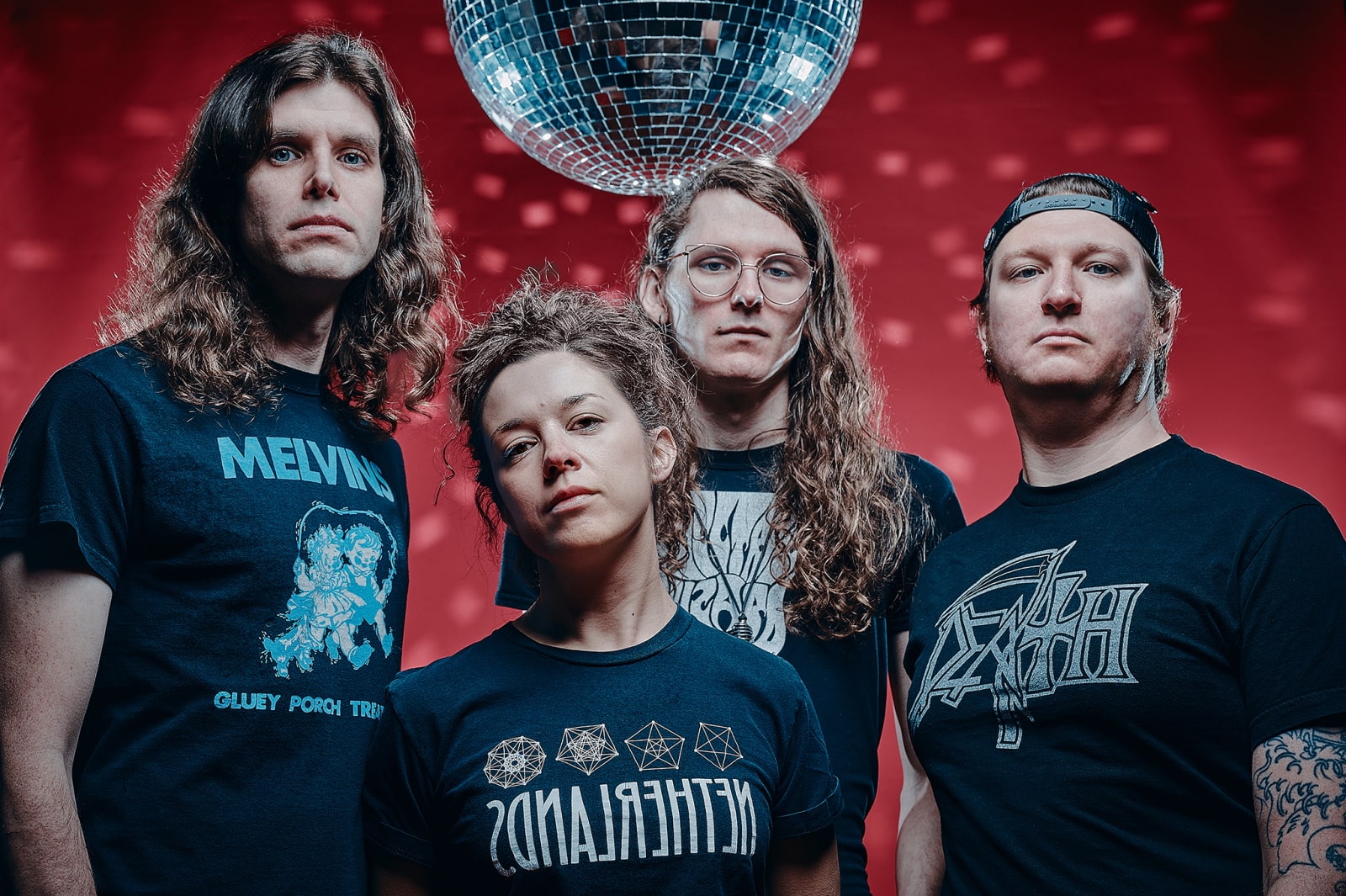
Boris
Francis Beringer, bass/vocals: The Japanese avant garde titans took their name from the legendary sludge metal Melvins song “Boris” off Bullhead.
And then proceeded to use Melvins as an inspiration for a lengthy career of doing whatever they want to do, under any genre, whenever they want, however they want.
Walls of pure guitar drone? Light and airy shoegaze? D-beat punk? 70’s fuzz worship? Contemplative indie rock? Dance pop? Post metal of the most soaring and uplighting variety? Extreme metal of the most depressing and tortured variety? Literally anything and everything goes with Boris. They may be really hit or miss, but it’s because they put out so much material. Either way, I’m here for anything they do.
The Mars Volta
Jacob Kimberley, guitar: This band, for me, has informed Glass Enclosed Nerve Center as much as they have informed many of my projects in the past. Upon first discovering them as a young teen, they blew my mind wide open to many styles of music that I had not previously been exposed to, having been a strict Led Zeppelin devotee beforehand.
They may not always be catchy or accessible, but they lit a fire in me that has only grown stronger over the last decade of marination, backsliding and rediscovery. They inspire a craving for the unknown and the unthinkable, and when I’m in a creative rut, they always manage to pull me out of it with a fresh perspective.
King Crimson
Francis Beringer, bass/vocals: King Crimson is in many ways the original pure genre-bending hard rock band. Robert Fripp’s vision has never strayed from making only the music he wants and nothing else, and requiring, and demanding, perfection from his bandmates in executing that often exacting and bizarre vision.
The first version of this band was the most conventional, and that’s saying something, considering their unique blend of hard rock, folk, jazz, and chamber music. Still, the original King Crimson had something in common with their “progressive rock” peers.
The second lineup, starting with the legendary Lark’s Tongues in Aspic record, made music that sounded like nothing before or since, a trippy amalgamation of eastern european music, heavy metal, free jazz and modernist classical. Some of it was “noise rock” twenty years before the term even existed.
The third lineup, still consisting of Fripp and perhaps the greatest drummer of all time, Bill Bruford, shifted yet again, moving toward a polyrhythmic sound rooted in Indonesian gamelan, new wave pop, electronic music and experimental hard rock.
Next, the band shifted towards a more expansive heavy metal sound before settling on a three drummer, seven man lineup featuring original saxophonist Mel Collins that completely rearranged and reinterpreted the previous 50 years of music. King Crimson’s influence is all over our latest album. We hope it’s not too obvious.
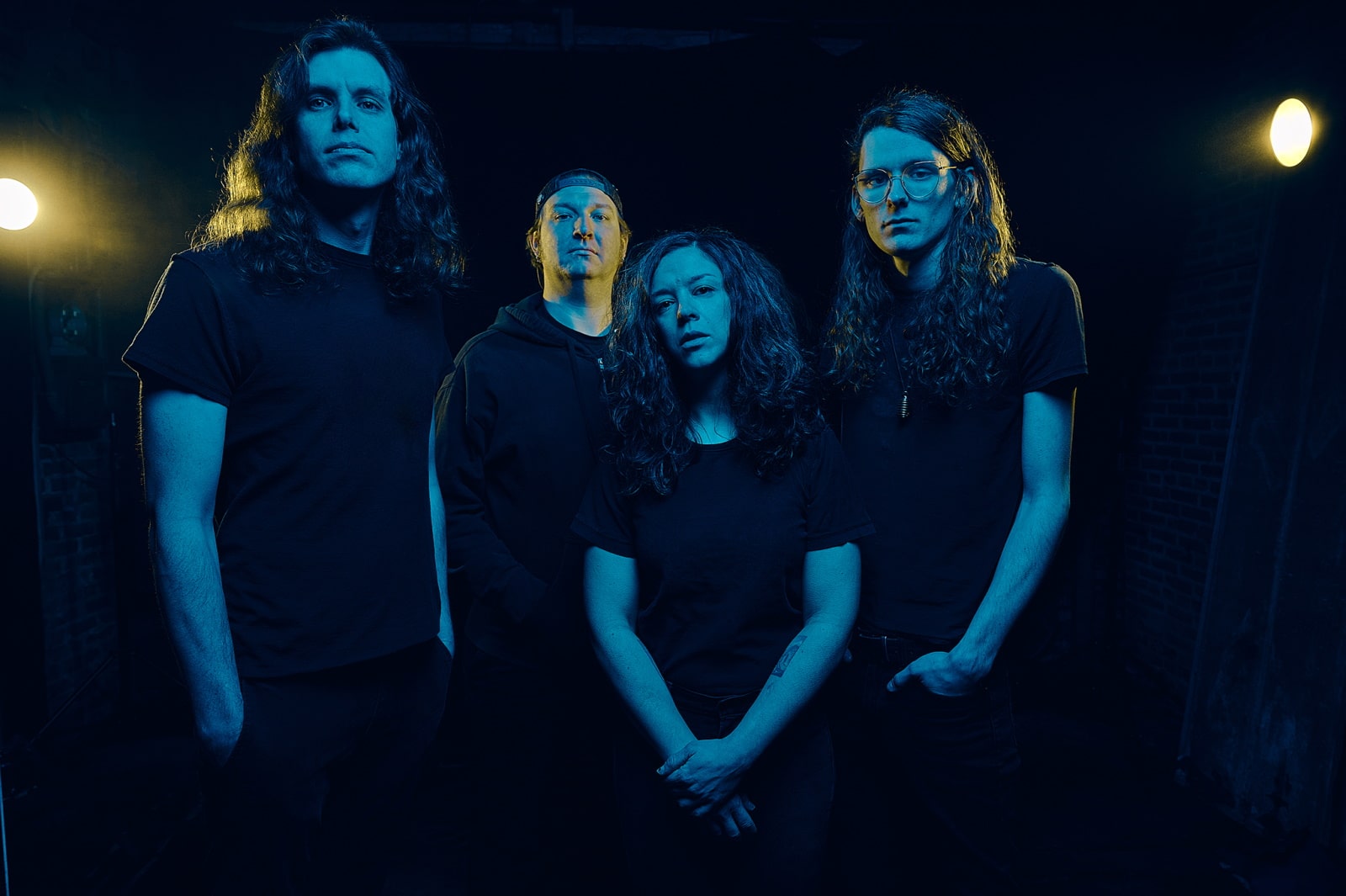
Faith No More
Andrew Yonki, guitar: Those who know, already know. For those who only know Faith No More for “Epic,” that song is great and very important, but they are so much more. Mike Patton is one of the greatest rock vocalists of all time, with not only an impressive range but also a fearlessness in how he USES that range that sets him apart.
With Patton at the helm, FNM surpassed all other major label rock bands in the 90s in how far they pushed the boundaries, and subverted expectations at every turn. It’s hard to imagine another band out there that will employ a maniacally gibbering monologue over creepy circus-piano music (“RV” off of Angel Dust), a classic punk rock album-driver (“From Out of Nowhere” off of The Real Thing), a pensive yet soaring anthem (“Last Cup of Sorrow” from Album of the Year), and a flawlessly sincere easy-listening cover (“Easy,” originally by Lionel Ritchie, from Angel Dust) and not only make it all make sense, but between their songwriting and musicianship, make it sound better than 90% of other bands in existence.
The Clash
Andrew Yonki, guitar: Flying in the face of what the music press declared to be a “punk rock movement,” the Clash quickly showed that genre conventions and rules were meaningless.
They absolutely knew how to play loud and fast punk rock and roll, but quickly outgrew that as early as their second full-length album Give ‘Em Enough Rope. A cursory exploration of the rest of their discography will find quintessential punk rock barnburners (“Complete Control”), gateways to ska (“Revolution Rock”), dub-reggae ballads (“Bank Robber”), sincere forays into rap (“The Magnificent Seven”), funky curiosities (“Rock the Casbah”) and some of the best rock and roll pop songs ever crafted (“Train In Vain”). It’s hard to claim nowadays that they’re “The Only Band That Matters,” but it’s impossible to ignore how much they do matter to those who helped forge the modern musical landscape, especially outside the mainstream.
Fugazi
Andrew Yonki, guitar: Not dissimilar from the Clash, Fugazi is the kind of band that people “know” is a punk or hardcore band, but that tells a very small part of the story.
Musically, Fugazi uses punk rock as a jumping-off point (literally, if you’ve seen live footage, or seen them live if you’re lucky) to explore the entirety of musical dynamics, from quiet to loud to fast to slow and often in the same song. When a group of musicians has the level of interplay and near-telepathy that Fugazi would display on record, it becomes possible to break beyond any strictures of hardcore orthodoxy into any direction they pleased, be it bass-driven near-reggae, busy math-rock, or jagged, noisy blasts of post-hardcore. Check out “Epic Problem,” “Shut the Door,” “Turnover,” “Break,” and “Caustic Acrostic.”
Primus
Francis Beringer, bass/vocals: Primus is in some ways the most genre-agnostic band on this list because their entire sound might as well be its own genre. It’s barely holding onto the rock classification as is. It’s certainly not funk, nor is it metal, nor is it punk.
Les Claypool’s insane funk-bass is played in the service of noise-prog agitation, not dancing. The vocals and lyrics often have more in common with old time music, outlaw country, stand up comedy and spoken word than with any hard rock conventions. The drums, moving among Neil Peart precision to John Bonham stomp, are probably the most normal part of this band, and if you see Tim “Herb” Alexander play live, that’s saying something because few drummers would dare to play parts that creatively demanding.
Ler LaLonde is a guitar hero shredder who lets the bass take the lead and colors the songs with a noisy jazz-prog technique that is solely his own. Probably the most unique, strangest rock band to ever sell a million records. Even within Primus’ insane catalog, my favorite record will always be Pork Soda because it’s the most eclectic within a framework that is already pure madness.
ZZ Top
Francis Beringer, bass/vocals: Anyone who knows me probably figured I’d put Rush in here, but I’ve written so much much about my favorite band, I thought I’d throw a genre-mashing dark horse power trio in the mix and include ZZ Top.
Lots of people think of them as a white blues band, and what could be less eclectic than that? But to me, ZZ Top is the quintessential all-American rock band, and they put so much more into their music than the Texas shuffle. ZZ Top possessed a deep understanding and respect for the blues, but also for heavy rock and distorted and feedbacked guitar, Mexican music, country music of several varieties, soul and gospel, and, by the mid-70s, avant garde experimentalism and soundscapes.
Listen to the relatively unknown album Tejas, and some of the stranger cuts off Deguello, and it’s pretty obvious this is not a three chord boogie band.
Part of the authenticity of ZZ Top is that they generally didn’t do blues covers and their original material dripped with a studied reverence for their influences, quite rare among bluesy hard rock bands of the era. “Have You Heard?” from Tres Hombres sounds like a genuine old fashioned spiritual, for instance. It’s hard to believe “Jesus Just Left Chicago” and “Waiting For The Bus” are originals, not Delta folk songs. This is all before ZZ Top incorporated dance music, synth-pop and new wave into their bluesy hard rock for the absolutely insane “Depeche Mode-meets-Muddy Waters meets-Herbie Hancock” early 80s material.
They never stopped innovating and genre mashing, incorporating even more Tejano music influences along with electronica and metal (Mescalero in 2003), and even exploring Houston hip hop on 2012’s La Futura.



